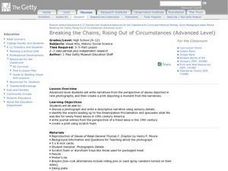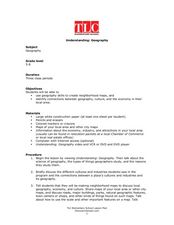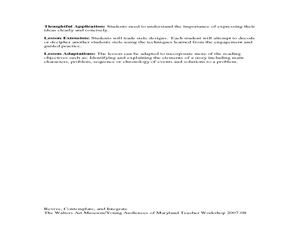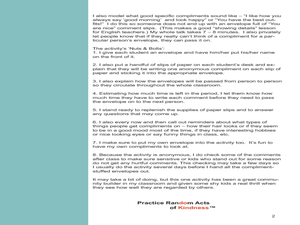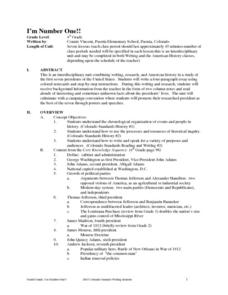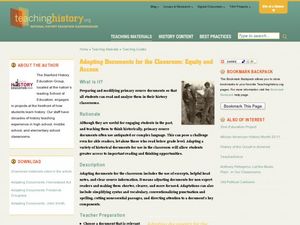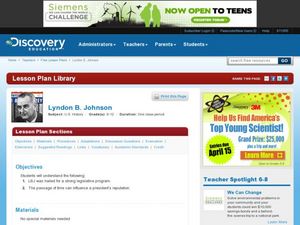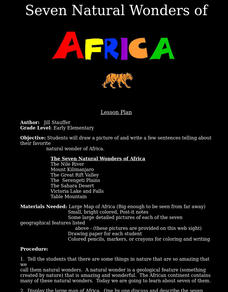Curated OER
Breaking the Chains, Rising Out of Circumstances
Young scholars develop an understanding of art and history. In this lesson about sculpture and creating a mood, students will gain an understanding of a moment in history by observing art. Young scholars observe busts, and paintings from...
Curated OER
Understanding: Geography
Students explore their neighborhoods. In this geography lesson plan, students make a map of their neighborhood. They must include a key, natural terrain, buildings and streets. They also write a descriptive paragraph about their...
Curated OER
A World At Peace
Students view a film segment and identify examples of world conflict. They examine why groups fight for control of land or natural resources. They discover ways in which conflict can be avoided.
Curated OER
American Culture in a Musical Setting
Students discover the significance of similarities and contrasts of three separate cultures of the United States through music. They take out maps and trace the expedition of the Spanish along the coasts of Mexico and North and South...
Curated OER
Mock Trial
Students rewrite a traditional fairy tale to represent the viewpoint of the villain. They participate in a mock trial of that villain in which all regular court participants (judge, jury, defendant, witnesses, plaintiff, etc) play roles.
Curated OER
The Scramble for Wealth And Power
Students participate in a simulation activity involving the distribution of the world's wealth and power. The activity starts when 100 pennies, representing wealth and power, are spread on the floor and students must grab as many...
Curated OER
Cultural Diversity in Nebraska (Scottsbluff)
Students experience a new appreciation of cultural diversity involving different people, places, and environments. They research family backgrounds, use technology to exchange information, create a map depicting ethnic concentrations and...
Curated OER
Egyptian Symbols: What story do they tell?
Students create a stele to represent what symbols are the most important to them. In this symbols lesson plan, students learn about Egyptian symbols, and then put their own important symbols into model magic clay according to their size...
Curated OER
Passing Notes
Students demonstrate the importance of sharing compliments. In this character education lesson plan, students write compliments on post-it notes to one of their classmates.
Curated OER
Jesus: His Life
Students explore how Jesus was a simple carpenter, yet His words transformed the course of Western Civilization. From his birth in Bethlehem to His final days and crucifixion.
Curated OER
The 36th President: Lyndon B. Johnson, US History
Learners research and analyze Lyndon B. Johnson's achievements as the 36th President focusing on his legislative program. They consider how the passage of time can influence a President's reputation.
Curated OER
I'm Number One!
Fourth graders complete a unit of lessons on the first seven presidents of the U.S. They conduct research, write a four-paragraph essay, and create posters and speeches for a simulated campaign convention.
Curated OER
New Year Celebrations in China (Chun Jie)
Fifth graders compare and contrast the traditions and customs of the holiday with those in Korea and Japan. They express themselves with few non-native grammatical errors in speaking and writing; develop and use background...
Curated OER
Views of 9/11
Fifth graders examine through research ways people around the world viewed events of September 11, 2001, analyze how United States foreign policies have caused conflict with other regions and countries, research and read first person...
Curated OER
Art to Zoo: India-Where Remarkable Differences Are Ordinary
Young scholars "visit" India to learn about its culture and the lives of children in India. In this India instructional activity, students conduct research and report on the lives of Indian children in the form of a mock interview...
Curated OER
The Impact
Students investigate the impact inventions have on people. In this technology lesson, students explore inventions, such as the light bulb, and identify ways the invention impacted society. Students design a simple project that could...
Curated OER
Haring Inspired Wall Murals
Students complete a community service project for their school. In this community service lesson plan, students and volunteers help paint murals on the walls of the school. Students learn about Keith Haring and paint their murals...
Curated OER
Adapting Documents for the Classroom: Equity and Access
Students examine primary sources to gain historical perspectives. For this historical analysis lesson, students analyze documents that their instructors have adapted to make more user-friendly. Example adapted primary documents are...
Curated OER
Lyndon B. Johnson
Students take a closer look at legislation passed in the 1960s. In this Great Society lesson, students research 6 key pieces of legislation signed into law by Johnson. Students use their findings to write collaborative reports.
Curated OER
Did Jack break the law?:
Students identify the process for settling a legal dispute, identify key players in a legal dispute (who presents the facts; who makes the final decision) and determine what makes a decision fair.
Curated OER
That's MY Pencil: Simplified Mock Trial
Learners identify the process for settling a legal dispute, identify key players in a legal dispute (who presents the facts; who makes the final decision), and determine what makes a decision fair.
Curated OER
Frosty the Snowman
Students travel in the playing area (skip, gallop, walk, slide, etc.). If a student is tagged by a red (sun) ball, the tagged student must stop and fall slowly like a melting snowman. They stays melted until he/she is tagged by a green...
Curated OER
Seven Natural Wonders of Africa
Students draw a picture and write a few sentences telling about their favorite natural wonder of Africa. They discuss the importance of the Nile River, Mount Kilimanjaro, the Great Rift Valley, the Serengeti Plains, and the Sahara Desert.
Curated OER
Kameshi Ne Mpuku: An African Game
Students demonstrate an understanding that games reflect the environment of those who play them by creating their own games with the resources provided.


